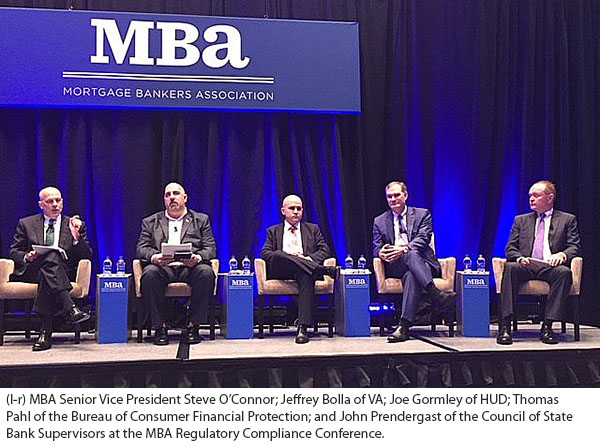
Regulators Focusing on Technology to Drive Efficiency
WASHINGTON, D.C.–HUD General Counsel J. Paul Compton Jr. said his first job is to “make sure the trains run on time.”
But Compton also noted that the department is committed to smoothing out bumps, including regulatory hurdles that inhibit lenders’ ability to serve customers effectively.
 “We are working toward making processes better,” Compton said here at the MBA Regulatory Compliance Conference. “We need better personnel; we need better technology. We’re working toward streamlining all our processes to better serve customers and lenders.”
“We are working toward making processes better,” Compton said here at the MBA Regulatory Compliance Conference. “We need better personnel; we need better technology. We’re working toward streamlining all our processes to better serve customers and lenders.”
Compton and a half-dozen other industry regulators appeared here at the conference to discuss their efforts to improve processes at their respective agencies. For some, the challenge involves trying to do more with already limited resources.
Former MBA Associate Counsel Joe Gormley, now Chief of Staff with HUD’s Office of Housing, said his department is focusing on streamlining FHA operations. “Our obsolete legacy systems really inhibit us from effectively manage our operations, and I’m hopeful we’ll be able to move from the Stone Age in the next couple of years,” he said. “Not only is the technology outdated, it’s also unmanageable…we have more than 120 million pieces of paper that moves through our system each year. This is unsustainable.”
Gormley noted the recent Senate T-HUD appropriations bill includes a $20 million appropriation to improve FHA technology. “We see it as a down payment,” he said. “Once we get the funding we see making improvements on the origination end; future enhancements will focusing on our claims and servicing systems.”
John Prendergast, Vice President of Supervision with the Conference of State Bank Supervisors, agreed. “One of the things the financial crisis taught us is that regulators could have used technology more efficiently,” he said. “We are looking to increase efficiencies in these aspects.”
Compton plays a key role with HUD’s Mortgagee Review Board, which addresses single-family issues within the Department and FHA. “We see our role as the gatekeeper in that process,” he said. We have to be smart in looking at ways to harness the power of the economy to make sure consumers are served. But we also have to look to avoid unintended consequences.”
 In a recent development, HUD initiated a Fair Housing Act complaint against Facebook, saying it engages in discriminatory practices. Facebook said it need not adhere to the Housing Act; HUD believes otherwise.
In a recent development, HUD initiated a Fair Housing Act complaint against Facebook, saying it engages in discriminatory practices. Facebook said it need not adhere to the Housing Act; HUD believes otherwise.
“I’m hopeful we’ll reach an agreement on this,” Compton said. “Facebook made some changes recently. But we believe very strongly that Facebook, like any other entity that advertises housing, must comply with the Fair Housing Act.”
HUD has also taken aim at Affirmatively Furthering Affordable Housing regulations; in August, HUD published a notice announcing its intent to amend these regulations, saying it wants to provide “more helpful guidance” to states and local communities in promoting fair housing choice with federal funds.
“It’s pages and pages of guidelines in an attempt to enforce 22 words,” Compton said. “We would expect that after getting comments, we’ll come back with a more straightforward rule that is aimed at getting results and encourage the production of affordable housing generally and pushes down the cost of housing. We also see the rule as adhering to a 1958 definition of redlining in some communities. That is not the intent of the rule; the rule should encourage affordable housing everywhere, not just certain neighborhoods.”
Jeffrey Bolla, Program Analyst with the Department of Veterans Affairs’ Loan Policy and Valuation Department, said his department is in a “build cycle” aimed at better communicating with lenders and consumers. He note the recently passed Economic Growth, Regulatory Relief, and Consumer Protection Act greatly impacted VA’s ability to better deal with consumers.
Bolla noted, for example, the law has had a major impact on the VA Interest Rate Reduction Refinance Loan program, which had been subject to a practice known as loan “churning,” by which certain lenders encouraged veterans to refinance loans, sometimes repeatedly and at higher rates, in such a way that it strips equity. MBA had strongly criticized the practice and championed provisions in the Act that discouraged churning.
Bolla noted since passage of the law, IRRRL refinances have fallen from 14,000 loans per month to fewer than 4,000 per month. “It’s had a huge effect,” he said.
Thomas B. Pahl, Policy Director of Research, Market and Regulations with the Bureau of Consumer Financial Protection, said the Bureau has a stronger emphasis on its “stated” objectives without exceeding its authority, noting the Bureau is focused on improving the rulemaking process. “We are trying to be far more cognizant of the effects of our regulations without imposing an undue burden in the process,” he said.
The Bureau recently issued more than a dozen Requests for Information on how to improve its rulemaking processes and operations; Pahl said the Bureau received more than 85,000 comments (including more than a dozen from MBA with more than 150 separate recommendations).
“We have an embarrassment of riches as far as ideas on how to change Bureau operations,” Pahl said. “Our job now is to determine which rulemakings should have priority to provide relief.”
Pahl said the RFI on how to change the Loan Originator Compensation rule generated a “tremendous” response. “We have looked at MBA’s comments and we are cognizant of MBA’s concerns,” he said. “Some of the concerns that have been raised certainly warrant scrutiny regarding how LOs are compensated and what kind of flexibility lenders could have in balancing [the playing field].”
